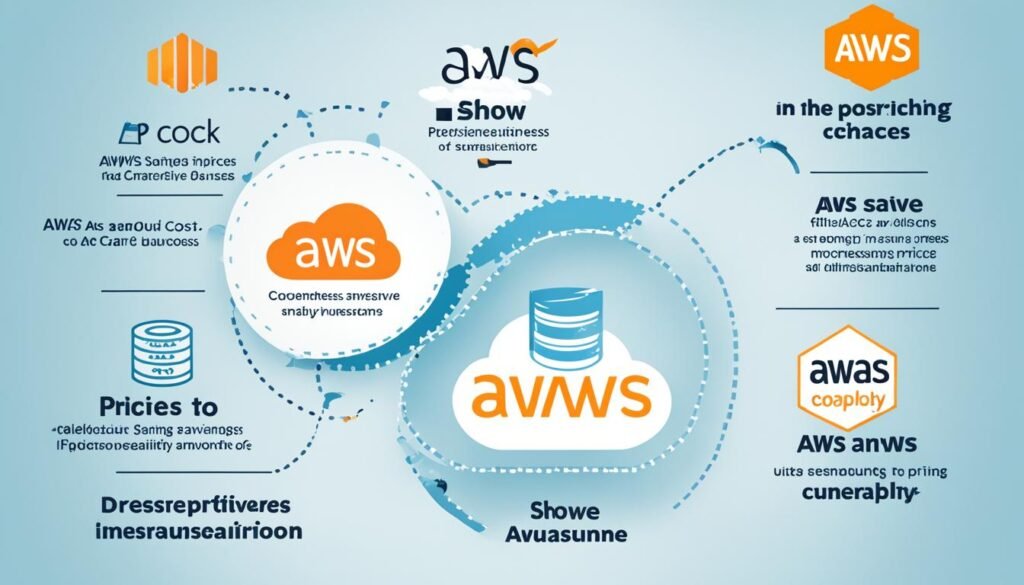Amazon Web Services (AWS) is a renowned company in the IT industry, specializing in cloud computing services. While AWS offers numerous benefits, it is crucial to understand the potential disadvantages before making a decision. These drawbacks include cost complexities, vendor lock-in concerns, and the need for specialized expertise.
Key Takeaways:
- AWS provides a wide range of cloud computing services.
- There are potential cost complexities associated with using AWS.
- Users may face vendor lock-in concerns when using AWS.
- Specialized expertise may be required to fully utilize AWS services.
Benefits of AWS
AWS, short for Amazon Web Services, offers a wide range of benefits to its users in the field of cloud computing. From ease of use and flexibility to affordability and unlimited server capacity, AWS provides a comprehensive solution for businesses seeking reliable IT services. Let’s explore these benefits in detail:
Ease of Use
One of the standout features of AWS is its user-friendly interface. The AWS Management Console provides easy access to various applications and services, simplifying the navigation and management of cloud computing resources. Users can quickly deploy programs and software without the need for on-site servers, making AWS an ideal choice for businesses of all sizes.
Diverse Array of Tools
With AWS, users have access to a vast and diverse array of tools and services. From cloud storage and computing to mobile services, analytics, and networking solutions, AWS offers a comprehensive suite of services to meet different IT needs. With over 70 services available, users can find the right tools to support their specific requirements.
Unlimited Server Capacity
For businesses with varying server demands, AWS provides unlimited server capacity. Whether you have a highly trafficked website or require secure email hosting services, AWS can handle it all. With its scalable infrastructure and reliable performance, AWS ensures that businesses can meet their server requirements without any limitations.
Reliable Encryption and Security
Security is a top priority for AWS, and it offers robust encryption and security measures to protect user data. With data centers located globally and stringent security protocols, AWS ensures the privacy and safety of data stored on its platform. This includes comprehensive data protection, identity and access management, infrastructure protection, threat detection, compliance, and data privacy measures.
Managed IT Services
AWS recognizes the challenges associated with managing IT infrastructure and offers managed IT services to alleviate these concerns. These services help businesses ensure the security and proper functioning of their IT systems, enabling them to focus on core operations and growth. By offloading IT management to AWS, businesses can optimize their resources and enhance their overall efficiency.
Flexibility and Affordability
Flexibility is a key advantage of utilizing AWS. Users have the flexibility to choose their preferred operating systems, web application platforms, and programming languages. This makes migration from existing platforms seamless and allows businesses to work with the tools they are familiar with. Additionally, AWS offers affordability with its pay-as-you-go pricing model, eliminating the need for large upfront investments and contractual commitments.
AWS truly stands out as a leading provider of cloud computing services, offering a range of benefits such as ease of use, a diverse array of tools, unlimited server capacity, reliable encryption and security, managed IT services, flexibility, and affordability. These advantages make AWS a compelling choice for businesses seeking reliable and scalable IT solutions.
Ease of Use

When signing up for AWS, users are greeted with a user-friendly interface called the AWS Management Console. This intuitive and easy-to-navigate interface provides access to a wide range of applications and services, making it simple for users to manage their cloud computing resources efficiently.
The AWS Management Console offers a clean and organized layout, allowing users to quickly access the various tools and features they need. With its user-friendly design, even those without extensive technical knowledge can easily navigate and utilize the services offered by AWS.
AWS understands the importance of simplicity and has developed a user-friendly interface that minimizes the learning curve typically associated with cloud computing platforms. By prioritizing usability, AWS ensures that users can easily access the services they need and efficiently manage their cloud resources.
In addition to the user-friendly interface, AWS also provides well-documented web services APIs. These APIs make it easier for developers to interact with AWS services programmatically, eliminating the need for an on-site server and allowing for the smooth deployment of programs and software.
With its user-friendly interface and well-documented web services APIs, AWS offers a seamless user experience that enables users to harness the full potential of cloud computing without the complexities typically associated with such platforms.
Benefits of the Ease of Use:
- Simplified cloud resource management
- Intuitive navigation and accessibility
- Reduced learning curve for non-technical users
- Efficient deployment of programs and software
Drawbacks of the Ease of Use:
- Potential over-reliance on the AWS Management Console for resource management
- Dependence on APIs for seamless program and software deployment
| Pros | Cons |
|---|---|
| Easy management of cloud resources | Over-reliance on the management console |
| Intuitive navigation for non-technical users | Dependence on APIs for program deployment |
| Efficient software and program deployment |
Diverse Array of Tools

While initially focused on cloud storage and computing, AWS has expanded its offerings to provide a diverse array of tools and services. This comprehensive suite of solutions caters to the various needs of businesses in different industries. Whether it’s storing and managing data, building and deploying applications, analyzing large datasets, or establishing robust network infrastructures, Amazon Web Services has got it covered.
“AWS’s commitment to continuously expanding and enhancing its toolset is evident in its portfolio of over 70 services.”
Let’s explore the wide range of tools and services that AWS has to offer:
1. Database Services:
With Amazon Web Services, you have access to scalable and reliable database solutions to meet your organization’s specific requirements. From fully managed relational databases like Amazon RDS to the flexible and high-performance NoSQL database service, Amazon DynamoDB, you can easily store, retrieve, and manage your data with efficiency.
2. Software Services:
Through AWS, you can leverage ready-to-use software services to streamline your business operations. From content management systems like WordPress and Drupal to customer relationship management (CRM) software such as Salesforce, you can quickly deploy and integrate these solutions into your workflow.
3. Mobile Services:
For businesses looking to build and deliver mobile applications, AWS provides a comprehensive set of services that simplify the development, testing, and management processes. From cloud-based backend services like Amazon API Gateway and AWS AppSync to secure authentication and authorization solutions, AWS offers the building blocks for creating exceptional mobile experiences.
4. Analytics Services:
Data is a valuable asset for businesses, and AWS equips you with robust analytics services to extract actionable insights from your data. Services like Amazon Redshift, Amazon Kinesis, and Amazon QuickSight enable you to collect, process, analyze, and visualize large datasets, empowering you to make data-driven decisions.
5. Networking Services:
In today’s interconnected world, a reliable and secure network infrastructure is essential for businesses to thrive. AWS offers a range of networking services that allow you to build and manage your network resources, ensuring seamless connectivity across multiple regions and data centers.
These are just a few examples of the wide array of tools and services available on AWS. Whether you’re a startup, a small business, or an enterprise, Amazon Web Services provides the necessary building blocks to accelerate your digital transformation journey.
Image:
| Tool/Service | Description |
|---|---|
| Database Services | Includes Amazon RDS, Amazon DynamoDB, and more |
| Software Services | Offers ready-to-use software solutions like WordPress, Salesforce, and more |
| Mobile Services | Enables the development and management of mobile applications |
| Analytics Services | Provides tools for collecting, analyzing, and visualizing data |
| Networking Services | Ensures reliable and secure network connectivity |
Unlimited Server Capacity

AWS, also known as Amazon Web Services, is a leading provider in cloud computing solutions. One of the standout features of AWS is its ability to handle any cloud server demand with ease. Whether you have a highly trafficked website or need secure email hosting services, AWS has got you covered.
With AWS, you have access to unlimited bandwidth, ensuring that your website can handle high volumes of traffic without any performance issues. This means that your website will always be available to your users, providing them with a seamless browsing experience.
In addition to unlimited bandwidth, AWS offers secure email hosting services. This means that you can confidently send and receive emails without worrying about security breaches. AWS takes data protection seriously, ensuring that your communications remain confidential.
When it comes to storing and managing your data, AWS provides a reliable platform. Their servers have the capacity to handle large amounts of information, giving you peace of mind knowing that your data is safe and easily accessible.
Take a look at the table below for a comparison of AWS’s unlimited server capacity with other cloud computing providers:
| Cloud Provider | Server Capacity | Bandwidth Limitations |
|---|---|---|
| AWS | Unlimited | None |
| Provider X | Limited | 500GB/month |
| Provider Y | Limited | 1TB/month |
As you can see, AWS stands out as the cloud computing provider with unlimited server capacity and no bandwidth limitations. This makes it an ideal choice for businesses looking for a reliable and scalable solution for their server needs.
With AWS’s unlimited server capacity, you can focus on growing your business without worrying about infrastructure limitations. Whether you need to scale up or handle peak traffic, AWS has the resources to meet your demands.
In the next section, we will explore another key benefit of AWS – its reliable encryption and security measures.
Reliable Encryption & Security

When it comes to data protection and security, Amazon Web Services (AWS) takes no chances. With a global network of data centers and rigorous security protocols, AWS ensures the privacy and safety of user data. The comprehensive encryption and security measures employed by AWS include:
- Data Protection: AWS implements robust measures to safeguard data from unauthorized access, ensuring the confidentiality and integrity of sensitive information.
- Identity and Access Management: AWS provides tools and services for managing user identities and controlling access to AWS resources, allowing organizations to enforce strict access policies.
- Infrastructure Protection: AWS employs advanced infrastructure security systems to defend against cyber threats, protecting the underlying infrastructure that supports AWS services.
- Threat Detection: AWS utilizes a range of sophisticated monitoring and detection tools to identify and respond to security incidents promptly, minimizing the impact of potential threats.
- Compliance: In compliance with various industry standards and regulations, AWS ensures that its services meet the stringent requirements for data security and privacy.
- Data Privacy: AWS prioritizes data privacy and provides features that enable organizations to store and process data in compliance with privacy regulations.
With these comprehensive encryption and security measures, AWS empowers businesses to confidently store and manage their data while mitigating the risks associated with unauthorized access and cyber threats.
“AWS ensures the privacy and safety of user data with robust encryption and security measures.”
Managed IT Services Are Available

Managing IT infrastructure can be a daunting task for businesses, especially when it comes to ensuring data and information security. That’s where AWS comes in with its managed IT services. These services are designed to provide businesses with the support and expertise they need to effectively manage their IT operations, allowing them to focus on their core business operations.
With the increasing number of information breaches and cyber threats, data and information security have become top priorities for businesses of all sizes. AWS understands this concern and offers managed IT services to help businesses mitigate risks, protect their sensitive data, and ensure compliance with industry regulations.
By leveraging AWS’s managed IT services, businesses can benefit from:
- 24/7 monitoring and security services to detect and prevent potential threats
- Regular software updates and patches to maintain a secure IT environment
- Backup and disaster recovery solutions to protect against data loss
- Identity and access management to control user access and permissions
- Comprehensive data encryption to safeguard sensitive information
With AWS’s managed IT services, businesses can offload the complexity of managing their IT infrastructure and focus on what they do best. Whether it’s a small startup or a large enterprise, AWS provides the necessary tools and expertise to ensure optimal security and operational efficiency.
Here’s an overview of the benefits of AWS’s managed IT services:
“AWS’s managed IT services empower businesses to prioritize their core operations while having peace of mind knowing that their IT infrastructure is in safe hands.”
By entrusting their IT needs to AWS, businesses can enhance their data and information security, minimize the risk of downtime and data breaches, and stay ahead in today’s competitive market.
Benefits of AWS’s Managed IT Services
| Benefits | Description |
|---|---|
| Enhanced Data Security | 24/7 monitoring, data encryption, and access control measures to protect sensitive information |
| Reduced Downtime | Proactive maintenance, backup solutions, and disaster recovery plans to minimize operational disruptions |
| Scalability | Flexible infrastructure that scales according to business needs, ensuring optimal performance |
| Expert Support | Access to AWS’s team of qualified professionals for technical assistance and guidance |
Flexibility & Affordability

AWS offers flexibility and affordability to its users, making it an attractive choice for businesses looking for cloud solutions. With AWS, users have the freedom to choose their preferred operating system (OS), web application platform, and programming language. This flexibility allows for seamless migration from existing platforms, saving time and resources.
Furthermore, AWS provides a range of cost-effective pricing options. Businesses can take advantage of pay-as-you-go models, where they only pay for the resources they use. This eliminates the need for upfront payments or long-term contracts, making AWS a flexible and affordable option for businesses of all sizes.
“AWS’s flexibility allows us to tailor our infrastructure to meet our specific business needs. We were able to choose the OS, web application platform, and programming language that best fit our requirements, enabling us to seamlessly transition our applications to the cloud.”
Whether you require a Windows or Linux-based environment, support for popular web development frameworks, or compatibility with your preferred programming language, AWS has you covered. The platform’s flexibility ensures that you can leverage your existing knowledge and skills while taking advantage of the power of the cloud.
By choosing AWS, businesses can realize significant cost savings while enjoying the benefits of a robust and scalable infrastructure. With its flexible options and affordable pricing, AWS is a top choice for businesses seeking convenience, cost-effectiveness, and scalability.
Benefits of AWS Flexibility and Affordability
| Benefits | Description |
|---|---|
| Choice of OS | Users can select their preferred operating system, such as Windows or Linux, to fit their specific needs. |
| Web Application Platform | AWS supports popular web development frameworks, providing flexibility in choosing the right platform for your applications. |
| Programming Language | Whether you prefer Java, Python, Ruby, or another programming language, AWS offers wide compatibility. |
| Seamless Migration | With AWS, businesses can smoothly transition their applications from on-premises environments or other cloud platforms. |
| Affordable Pricing | AWS offers pay-as-you-go models, eliminating the need for upfront payments or long-term contracts. |
| Scalability | Businesses can easily scale their infrastructure up or down based on their changing needs, optimizing costs. |
With AWS, businesses gain the flexibility to tailor their infrastructure to their unique requirements, while benefiting from cost-effective pricing models. Whether you need to deploy applications on a specific OS, utilize a preferred web application platform, or leverage a specific programming language, AWS empowers you with the flexibility and affordability needed to succeed in today’s digital landscape.
Disadvantages of AWS

Despite its many benefits, Amazon Web Services (AWS) does have some drawbacks that users should take into consideration before adopting the platform. Understanding these disadvantages can help businesses make informed decisions about whether AWS is the right choice for their cloud computing needs.
Billing Complexities
One of the potential challenges with AWS is its billing system. While AWS provides transparent billing practices, some users, especially non-technical business owners, may find it confusing to navigate. Without proper monitoring and management, users may unknowingly accumulate high bills, impacting their overall cost savings. Working with resellers or seeking assistance can be beneficial in understanding and effectively managing AWS billing.
Resource Limitations
Another limitation of AWS is the availability of resources. Depending on the region where the services are being utilized, there may be restrictions on access to specific resources. This can pose challenges for businesses with global operations or specific resource requirements that may not be available in certain areas. However, users have the option to request resource increases if needed, ensuring their requirements can be accommodated within AWS.
Common Cloud Computing Problems
While AWS provides a robust cloud computing infrastructure, it is not immune to common cloud computing problems. These problems can include issues such as backup protection, data leakage, privacy concerns, security vulnerabilities, downtime, and limited control over certain aspects of the infrastructure. It is essential for users to have a thorough understanding of these potential challenges and implement appropriate measures to mitigate risks and ensure data security.
“AWS offers an extensive range of cloud computing services, but it’s important to be aware of the potential drawbacks. By understanding the billing complexities, resource limitations, and common cloud computing problems, businesses can make informed decisions and take proactive measures to address these challenges.”
| Disadvantages of AWS | Description |
|---|---|
| Billing Complexities | The billing system can be confusing, potentially resulting in high bills if not carefully managed. |
| Resource Limitations | Access to certain resources may be limited based on the region, requiring resource requests for specific needs. |
| Common Cloud Computing Problems | Potential issues include backup protection, data leakage, privacy concerns, security vulnerabilities, downtime, and limited control over certain aspects of the infrastructure. |
Billing Can be Confusing

One of the drawbacks of using Amazon Web Services (AWS) is the potential for billing complexities, which can be especially confusing for non-techy business owners. While AWS strives to provide transparent billing, some users have reported experiencing unexpected high bills without realizing it.
“I started using AWS thinking I had a good grasp on the pricing structure, but soon I found myself facing a significant bill that I didn’t anticipate. It took me a while to understand the different pricing models and how they applied to my usage.”
To avoid these surprises and effectively manage your AWS billing, consider working with a reseller or seeking assistance from AWS specialists. They can help you understand the various pricing components, such as compute instances, data transfer, storage, and ancillary services. They can also guide you in optimizing your usage and implementing cost-saving measures.
By taking proactive steps to understand and manage your AWS billing, you can avoid potential financial pitfalls and ensure cost-effectiveness in utilizing AWS services.
Summary:
In summary, AWS billing complexities can catch non-techy users off guard, leading to unexpected high bills. To navigate these challenges, it is recommended to seek assistance from AWS specialists who can provide guidance on understanding and managing the transparent billing system. By doing so, businesses can effectively optimize their AWS usage and control costs.
Tips for Managing AWS Billing:
- Work with an AWS reseller or specialist to understand the pricing structure and potential cost implications.
- Regularly monitor your AWS account usage and expenses to identify any unexpected spikes or trends.
- Utilize AWS tools and cost management services to optimize resource allocation and minimize unnecessary expenses.
- Consider implementing budgeting and spending limits to maintain control over your AWS expenditure.
- Regularly review and adjust your AWS resources to ensure they align with your current needs and usage patterns.
| Common Billing Elements | Explanation |
|---|---|
| Compute Instances | The cost associated with running virtual servers in AWS, which varies based on instance type, operating system, and usage duration. |
| Data Transfer | The cost of transferring data in and out of AWS, including both inbound and outbound traffic. |
| Storage | The cost of storing data and files in AWS, which depends on the storage type (e.g., S3, EBS) and the amount of data stored. |
| Ancillary Services | Additional services such as DNS management, content delivery networks (CDNs), and database services that may incur additional costs. |
Amazon’s EC2 Limits

AWS imposes limitations on resources based on regions, which can impact users’ access to resources. These resource limitations are in place to ensure the security and fair usage of resources on the platform. As a new user, there are also limits on resource usage to prevent malicious intent.
However, AWS understands that businesses may have specific needs that require additional resources. In such cases, users can request resource increases to accommodate their requirements. This allows businesses to scale their operations effectively and efficiently.
“The ability to request resource increases on AWS is a valuable feature. It allows businesses to overcome potential limitations and access the resources they need to support their growth and development.”
Whether it’s increasing computing power or expanding storage capacity, AWS provides a straightforward process for users to request the necessary resource upgrades. By closely monitoring resource consumption and planning ahead, businesses can avoid hitting resource limits and experience uninterrupted access to the services they rely on.
It’s important for users to be aware of the regional restrictions and resource limitations when designing their AWS infrastructure. By understanding these constraints, businesses can optimize their resource allocation and make strategic decisions to ensure optimal performance and cost-effectiveness.
To visualize resource usage and potential limitations, refer to the table below:
| Resource | Limit |
|---|---|
| EC2 Instances | 20 instances per region for new accounts (can be increased upon request) |
| Amazon S3 Storage | Unlimited storage, but limited to 100 buckets per account (can be increased upon request) |
| Amazon RDS Instances | Currently, 40 instances per region for new accounts (can be increased upon request) |
A public cloud is a third-party managed platform that uses the standard cloud computing model to make resources and services available to remote users around the world.
A public cloud is a third-party managed platform that utilizes the standard cloud computing model to offer resources and services to users remotely, accessible from anywhere around the globe.
AWS pricing models, competition and customers
Get the flexibility of digital training with the depth of classroom training
Explore the AWS platform, cloud products, and capabilities
Employees at Amazon Web Services (AWS)
Database
AWS Services
Compute Service
Conclusion
In conclusion, Amazon Web Services (AWS) is a leading provider of cloud computing solutions, offering a multitude of benefits for businesses. With its user-friendly interface, diverse array of tools, and unlimited server capacity, AWS provides ease of use and scalability. Additionally, AWS prioritizes data security and offers reliable encryption measures, making it a trustworthy choice for storing sensitive information.
However, it is crucial for businesses to consider the potential drawbacks of AWS. The billing complexities and resource limitations may require careful planning and management. Additionally, common cloud computing problems such as backup protection, data leakage, and security concerns need to be addressed to ensure smooth operations.
When making a decision about whether to use AWS, businesses should carefully evaluate the benefits and drawbacks. By weighing the advantages of flexibility, affordability, and managed IT services against the potential challenges, businesses can make an informed decision that aligns with their specific IT needs and goals.
FAQs
What is AWS?
A: AWS (Amazon Web Services) is a cloud computing platform provided by Amazon, which offers a wide range of services for various purposes such as computing power, storage, and databases.
Q: What are the advantages of using AWS?
A: Some advantages of using AWS are:
– Scalability: AWS allows you to scale your resources up or down based on your needs.
– Cost Efficiency: With AWS, you only pay for the resources you use, which can help reduce costs compared to maintaining your own infrastructure.
– Flexibility: AWS offers a wide range of services and configurations, allowing you to customize your infrastructure according to your specific requirements.
– Reliability: AWS has a highly reliable infrastructure, with multiple data centers and backup systems, ensuring high availability of your applications and data.
Q: What is the disadvantage of using AWS?
A: One disadvantage of using AWS is the pricing. While AWS offers cost-efficient solutions, complex pricing structures and the potential for unexpected costs can make it challenging to estimate and control expenses.
Q: What is AWS Lambda?
A: AWS Lambda is a compute service provided by AWS that allows you to run code without provisioning or managing servers. It enables you to build applications and services that respond to events in real-time.
Q: What is Amazon S3?
A: Amazon S3 (Simple Storage Service) is a storage service offered by AWS, which provides object storage for storing and retrieving any amount of data from anywhere on the web.
Q: What is Amazon Redshift?
A: Amazon Redshift is a fully-managed data warehousing service offered by AWS. It is designed for analyzing large datasets and provides fast query performance by using columnar storage technology and parallelized query execution.
Q: What is AWS Glue?
A: AWS Glue is a fully-managed extract, transform, and load (ETL) service that makes it easy to prepare and load data for analytics. It automatically generates code to extract, transform, and load data from different sources, and it can handle both structured and semi-structured data.
Q: What is an AWS Virtual Private Cloud (VPC)?
A: An AWS Virtual Private Cloud (VPC) is a virtual network dedicated to your AWS account. It allows you to define a virtual network topology, configure IP addresses, subnets, route tables, and security settings, and connect your AWS resources in a secure and isolated manner.
Q: What is AWS CloudFormation?
A: AWS CloudFormation is a service that allows you to create and manage AWS resources using declarative templates. Templates are written in JSON or YAML and describe the infrastructure and resources you want to provision.
Q: How many services does AWS offer?
A: AWS offers over 200 services across various categories such as compute, storage, databases, networking, AI/ML, analytics, security, and more.
Q: What are some companies using AWS?
A: Some companies using AWS are Netflix, Airbnb, Spotify, Adobe, BMW, Samsung, and many more. AWS is widely adopted by startups, enterprises, and government organizations around the world.




